VMware just announced the end-of-availability for a number of its products. The company just listed a large number of mainstream products that are now end-of availability due to the Broadcom acquisition and the transition to subscription models. Products on this latest announcement are going to be felt by a large number of STH readers.
VMware End of Availability on Many VMware vSphere Editions
We are sourcing this from VMware KB 96168. All licensing options for the products below are end of availability (EOA) unless otherwise noted. When it comes to renewals, VMware is going to offer subscriptions for customers. Here is the EOA list from the VMware KB article:
| Products (all editions and pricing metrics) |
|---|
| VMware vSphere Enterprise Plus |
| VMware vSphere+ |
| VMware vSphere Standard (excluding subscription) |
| VMware vSphere ROBO |
| VMware vSphere Scale Out |
| VMware vSphere Desktop |
| VMware vSphere Acceleration Kits |
| VMware vSphere Essentials Kit |
| VMWare vSphere Essentials Plus Kit (excluding new subscription offering) |
| VMware vSphere Starter/Foundation |
| VMware vSphere with Operations Management |
| VMware vSphere Basic |
| VMware vSphere Advanced |
| VMware vSphere Storage Appliance |
| VMware vSphere Hypervisor |
| VMware Cloud Foundation (excluding new VCF subscription offering) |
| VMware Cloud Foundation for VDI |
| VMware Cloud Foundation for ROBO |
| VMware SDDC Manager |
| VMware vCenter Standard |
| VMware vCenter Foundation |
| VMware vSAN |
| VMware vSAN ROBO |
| VMware vSAN Desktop |
| VMware HCI Kit |
| VMware Site Recovery Manager |
| VMware Cloud Editions/Cloud Packs |
| VMware vCloud Suite |
| VMware Aria Suite (formerly vRealize Suite) |
| VMware Aria Universal Suite (formerly vRealize Cloud Universal) |
| vMware Aria Suite Term |
| VMware Aria Operations for Networks (formerly vRealize Network Insight) |
| VMWare Aria Operations for Networks Universal (formerly vRealize Network Insight Universal) |
| VMware vRealize Network Insight ROBO |
| VMWare Aria Operations for Logs (formerly vRealize Log Insight) |
| VMware vRealize Operations 8 Application Monitoring Add-On |
| VMware Aria Operations |
| VMware Aria Automation |
| VMware Aria Automation for Secure Hosts add-on (formerly SaltStack SecOps) |
| VMware vRealize Automation SaltStack SecOps add-on |
| VMware Aria Operations for Integrations (formerly vRealize True Visibility Suite) |
| VMware Cloud Director |
| Cloud Director Service |
| VMware NSX |
| VMware NSX for Desktop |
| VMware NSX ROBO |
| VMware NSX Distributed Firewall |
| VMware NSX Gateway Firewall |
| VMware NSX Threat Prevention to Distributed Firewall |
| VMware NSX Threat Prevention to Gateway Firewall |
| VMware NSX Advanced Threat Prevention to Distributed Firewall |
| VMware NSX Advanced Threat Prevention to Gateway Firewall |
| VMware NSX Advanced Load Balancer (excluding Subscription, SaaS) |
| VMware Container Networking Enterprise with Antrea |
| VMware HCX |
| VMware HCX+ |
That is a massive amount of mainstream products that folks ask us about in reviews.
We wanted to see how this would impact onboarding new users. One prediction we made was that the Broadcom acquisition of VMware would follow a similar path to other VMware acquisitions and focus on squeezing more profit from larger customers at the expense of smaller customers. Something fun we tried was looking at our VMware vSphere 8 evaluation center that we used about two years ago, but never installed.
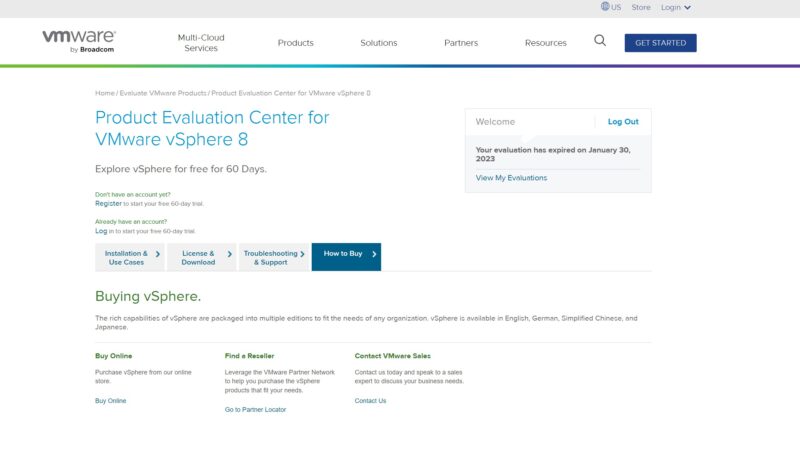
The trial for the product expired, and our options are now to do things like buy online. Since vSphere 8 perpetual is on the EOA list, our guess was that we would not be able to buy it from the online store’s “Buy Online” link. When we went to the store page, we saw only desktop options.
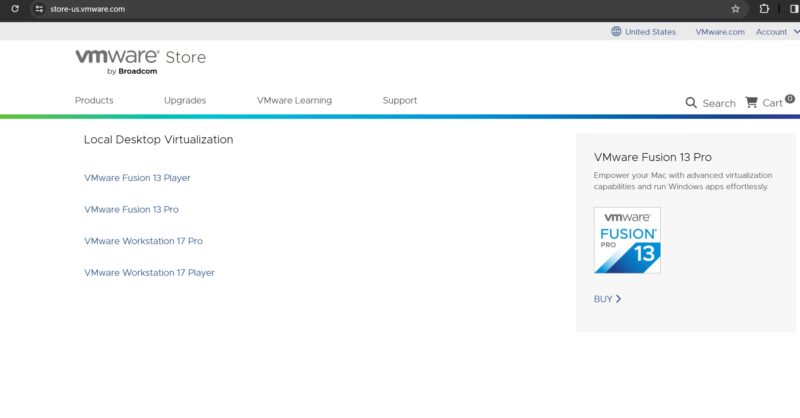
At this point, our option if we wanted to try VMware vSphere would be to contact a reseller or sales and get a subscription, which was not the model we evaluated a year or two ago.
Final Words
It seems as though the prediction when the deal was announced that smaller customers would be in for some churn is right. VMware’s shift to subscriptions is so abrupt that the simple small VMware buyer’s journey from evaluation to purchase for a core product like VMware vSphere is broken even a day after the EOA announcement went out.
If you are a smaller VMware customer and do not have a plan for migration, this might be a scary development. Of course, we would love to hear what our readers think.

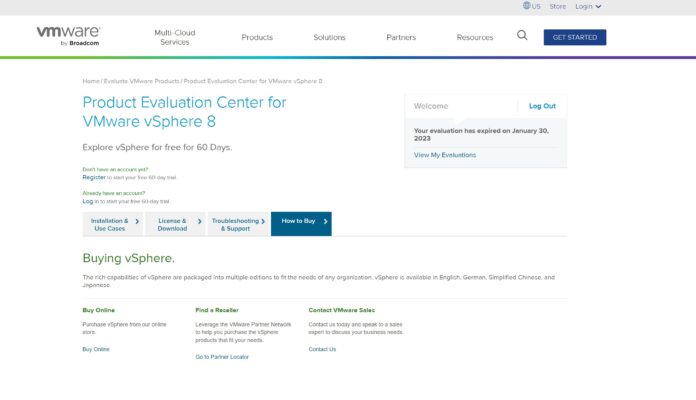
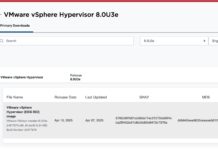
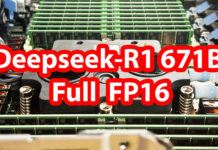
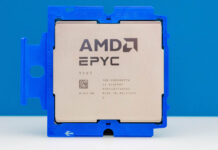
In summer 2022, after retiring from my capstone IT position tending to the hardware and software needs of 5K Linux servers for an HFT firm in suburban NYC and moving full-time to Cape Cod Mass, I was interviewing for an IT position for nearby local government…Being a programmer / Linux Sys Admin, and said town being evidently a muy pequeno VMware shop, I didn’t get the position. Fair enough…During the interview I mentioned to the town’s head of IT (AKA the town comptroller) and their VMware consultant, that Broadcom was in the process of procuring VMware, and given BC’s track record, this might effect smaller customers…All I got was blank stares, as if I had just started speaking Greek….Just maybe the town’s IT staff remembers said conversation at this point. Maybe not.
Seems Broadcom’s reputation of destroying brands and screwing customers will continue.
Ironically I was just talking with my coworkers about this and how we should start planning to move away from it if possible
Carl, thank you for sharing your resume for some reason. Also, it affected smaller customers, not effected.
VMware was like the Linux for idiots, or for most Microsoft-based shops that dare not think of Linux as a thing, but need virtualization still. Now comes the reckoning, Broadcom just bought it to shake them down, bleed dollars from turnips, and nothing more.
As Microsoft shops will do, they’ll pay Broadcom vs make hard work for themselves to migrate off sensibly as they should, and Broadcom knows this.
Switch to proxomox. Reliable and easy
Going from evaluation to subscription is simple, easy and costs less than perpetual plus support for smaller size customers. So don’t know the BS in this article is about without having actually talking to VMware by Broadcom sales rep and actually getting the much better offers than the complex licensing of the old VMware.
I’m not sure what the hullabaloo is all about. I’ve been using VMware at different places for the last 20 odd years or so??
Some was free some was not. Support was available at a cost either directly from VMware or thru 3rd party support.
So if I have 12 VM servers on a production instance of ESX 6, I renew support every 3 years under the old packaging. Now I’ll renew annually??? I guess???
So what’s the big issue? I should migrate because I have to renew more often??? I must be missing something…
Also if you are only evaluating, grab a vmug sub, should meet just about everyone’s needs as far as eval goes.
That being said, the new bundles (VVS and VVF) are actually priced very similarly to the old subscription licences, and which is to say significantly less than perpetual licences. What I’m currently annoyed with is VMware have blocked adding vSAN to VVS at a later date, you have to shift to VVF where a lot of small enterprises couldn’t care less about kubernetes or most of the add-ons. I predict this first stab will get customers seriously considering proxmox that don’t foresee a need for anything other that a reliable hypervisor. Broadcom will adapt though, they always do, this is the first salvo to validate (or not) market appetite.
I’m so glad I was able to convince my company to jump ship at the first whiff of a merger. I think there was still some bad blood from the Symantec deal that helped, but we’ve migrated fully from VMware at this point and never looked back.
I’m at the point where I won’t touch anything Broadcom anymore. Between their software track record and their hardware, they’re going in the bucket.
We are a small customer with 15 hosts.
Going subscription saved us a ton of money. We get a lot more service for less overall money.
I hate broadcom don’t get me wrong but this really isn’t as big a deal as you are making it out to be.
Proxmox does not compare to the vmware ecosystem in real IT Environments. The real world is not a lab.
@Mack: You won’t be able to stop paying. The moment you stop is the moment you lose the right to use the software. This also puts all the power in Broadcom’s hands since they can just increase the subscription without any regard for your ability to pay it.
With the old perpetual licensing you could have still used the software, just without support and updates. Now you can’t acquire such a license at all.
If only Openstack had a modern and nice GUI… (and easy to install)
The company I work for has a small cloud hosting business on VMware. This has caused us so many issues that we are now having to figure out how to get off of VMware without affecting customers.
This is causing some headaches for a customer of mine, they’re a quasi government institution and are planning to build new infrastructure on VMWare – it takes some time of going through a bidding process and usually also means getting a gaggle of external consultants to build out the infrastructure. That whole process might now have to be started anew, throwing the project widely off-schedule, and might of course also result in a lawsuit.
Working as an electronics engineer in a relatively small company, I always advice to avoid brands like Broadcom, Intel,…
They are arrogant, neglect smallere customers, parts get obsolete before the prototype is finished and are often made of unobtanium.
The also closed off OEM sales. I met with Nutanix today who are gleeful at this stuff going on since the acquistion – so are Microsoft
I just have one question : if you encounter a technical/financial/human problem that causes you to miss the renewal deadline, the host stops working?
“If you want your data, you have to pay? (Like ransomeware)
Standalone hypervisor was free and stays free (only harder to find).
For lab setup there is always VMUG Advantage – much more what free standalone hypervisor gives (vSphere Ent+, vSAN, NSX, TKG, Aria) for reasonable price (200 USD/year)
For paying customers (commercial/enterprises), I doubt article was about that and their take will be case by case.
comparing Proxomox to VMware is amazing. there is a reason VMware vSphere was and is a market leader, for a serious environment there is no alternative, besides perhaps Nutanix. Going to the cloud? well, didn’t we all wake up from that bad dream? Going to Hyper-V? I try not to laugh. As someone said, the real world is not a lab. good stuff sadly does come with a price.
For front-end, the only real alternative is modernizing our apps, the stupid lifelong dependency on Microsoft Windows is way more hurting than a subscription for an infrastructure environment.
@Fab G.: It seems that way. They will probably have a safety buffer. ESXi itself has a 60-day evaluation period so the mechanism is there.
@Mandarinas: While vSphere Hypervisor is indeed “free” (you still have to register and ask for a key) it is severely limited (single host, VMs limited to 8 cores, no vCenter, no write access to APIs) and by comparison most serious free alternatives are superior.
@EUCConsultant: “comparing Proxomox to VMware is amazing” And why is it “amazing” exactly? Have you evaluated a fully converged (with Ceph network storage) Proxmox cluster?
Just because software is open source with paid support, like Proxmox, it doesn’t mean it is not able to “play with the big guys”. Proxmox has advanced tremendously in recent years, and many are using it in production. Not every problem is tackled yet, but most use cases of small and medium businesses can be serviced by it easily.
they took that kb down….maybe second thoughts about nuking everything they offer?
If I can not purchase perpetual license anymore I will just sit on the license I own. When I have to upgrade I will move to another product
@mack you run a small shop with few offerings. There is so much to this Broadcom thing that affects so many people. There are more changes than this. Other places that have hundreds of grand and more in man hours invested into VMware SaaS offerings now have to bring all the back onsite because VMware discontinues SaaS offerings and brings that under the VCF umbrella.
Rumor has it one large company which uses VMWare is getting the shake down already on licensing. Like many millions of dollars annually.
Hello!
How, if at all, does this affect the free ESXi (I’m not sure but I think it is called VMware vSphere Hypervisor 8) many of us run at home?
A lot of people recommends Proxmox – I was wondering if it supports similar level of granular RACI, backup sw integration and cross-cluster VM migrations like vSphere?
@mack it’s not about having to renew more often, it’s about the renewal cost especially if you used essentials.
You’ll now be forced into essentials plus or vsphere standard, whichever works out cheaper in each use case.
The price is also per core with a 16 core per socket minimum.
So if you have 3 hosts on essentials you’ll now need to pay for 16 cores per host.
Something like $1500 a year.
I think essentials plus is a 96 core kit so that’s even more. Crazy.
So no, not just renewing more often, renewing at 10x the cost.
If it is Broadcom’s intention to pick the bones of VMware clean, they will then sell the husk off to Attachmate, where it will spend its afterlife alongside Novell Netware and other has-beens.
The new cost is insane for us
-we had 5 ESXi hosts
–3 of the ESXi hosts were for “production” and other 2 were for DR
—we had 2 Essentials plus licenses to cover our hosts
Last year we paid around 2k, for our VMware license renew. With the new licensing, our VMware cost is 30k a year. We have not renewed, as I didn’t budget for this amount. I used to love VMware, but looking into alternatives….